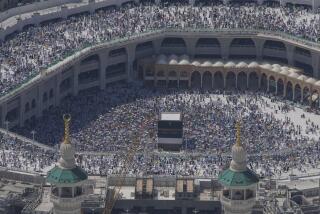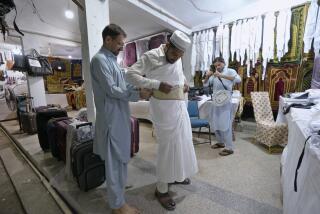Tourism in Egypt a Casualty of Gulf Crisis
CAIRO — As July ended, Egypt was celebrating a tourism boom--with no end in sight. There were almost 3 million visitors last year, and officials had visions of 5 million by 1995.
Egypt finally was returning as an international tourist mecca after years of Middle East uncertainty that had devastated an industry as old as the pyramids.
Then, on Aug. 2, Iraq invaded Kuwait.
“Tourism is an industry sensitive to regional politics,” said Fuad Sultan, Egypt’s tourism minister. “If you’re scared to travel to a country, you don’t come.”
And many are not coming. Overall tourism is down 40%. Tourism from the United States has dried up almost overnight. Holy Land tours to Egypt and Israel are being canceled en masse.
“One man, Saddam Hussein, has managed to convince the world that the whole Middle East is embroiled in a holy war, Muslims killing Christians, another crusade,” Sultan said.
“In one day Saddam Hussein undid what we took five years to build: a large American tourist market. He convinced tourists that God and Satan were slugging it out on the streets of Cairo, that Christians would be killed if they came to a Muslim country.
“What rubbish!”
Sultan said his envoys are spreading the word that Egypt, 1,000 miles from Iraq, is safe.
“Every tourist who doesn’t come here because of this man’s echoes, his mouthing off, is letting Saddam Hussein win,” he said.
Annual tourist figures, calculated every July, were being readied for public release at the time of the Iraqi invasion. Sultan said 2.8 million visitors deposited more than $2.5 billion into Egypt’s debt-ridden economy in the previous 12 months, an all-time high. Almost 150,000 Americans and nearly 1.2 million Europeans visited Egypt.
Sultan said cancellations were few early in August. The industry was in good shape because of a large number of well-to-do Arab families spending the summer in Cairo. Pre-paid Western tour groups also still came.
But by this month officials feared the worst as they looked ahead to the beginning of Egypt’s major tourist season in October.
“We went to work to pick up European tourists to make up for the disappearing Americans,” Sultan said. “We knew that people weren’t coming because they were scared. We realized there is nothing to be done for a tourist who is panicked, afraid he can’t get back home if fighting occurs.
“But there is something we can do for a tourist who wants to come but has a few doubts. We can persuade him to come. This is what’s happening. We are taking steps to reassure the Americans they should really come ahead.”
Alia Noor is the Cairo-based national sales manager for the Hilton Hotel chain. She said American cancellations are running about 50% so far but that her staff is on the telephone daily to ensure that European charter flights don’t cancel.
“So far it’s worked,” she said. “We keep telling people to come here and see for yourself. Cairo’s great.”
Hassan Kamy, head of a large Egyptian tourist company, blames sensationalism in the foreign news media for slanting Middle East events.
“We’re a long way from Iraq, from the action,” Kamy said. “Nothing’s happening here. But the media, particularly the American media, have sensationalized what’s happening in Egypt by 200% at least.
“We’re suffering. I keep saying to other travel agents we must get out, call our agents around the world, tell them Egypt is fine, bring the people.”
Tension in the Middle East affects tourism according to the nationality of the tourist, he said.
“Most Europeans have come despite the problems. The Germans are great. They’re stubborn. They come anyhow. The Asians are far away and plan and pay ahead. So they’re still coming,” Kamy said.
But he said there are two critical areas: international conferences and Americans.
“Conferences. Forget them. And the Americans. We’ve been in touch with our American travel agencies. They say they want to come ahead even with smaller groups, but nobody will come.”
More to Read
Sign up for The Wild
We’ll help you find the best places to hike, bike and run, as well as the perfect silent spots for meditation and yoga.
You may occasionally receive promotional content from the Los Angeles Times.






